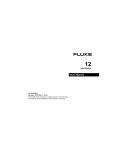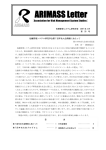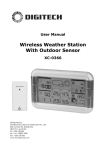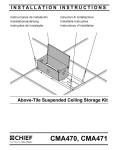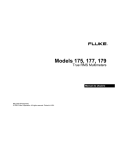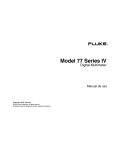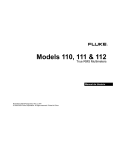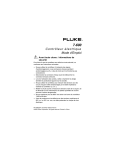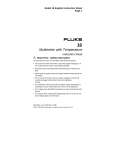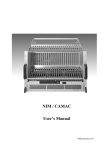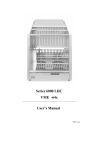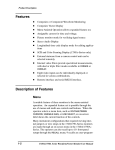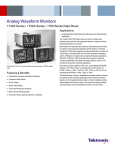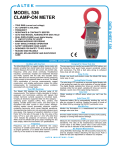Download Fluke 10 User Manual
Transcript
® 10 Multimeter Users Manual © 1991-2001 Fluke Corporation, All rights reserved. Printed in USA All product names are trademarks of their respective companies. 10 MULTIMETER m m Mk SELECT RANGE OFF VDC VAC 600V COM + acz06f.eps 10 Users Manual Contents Page Read First -- Safety Information.................................................................. Contacting Fluke for Service, Accessories, or Parts ................................... Standby Mode ............................................................................................ Operating Features..................................................................................... Using Accessories ...................................................................................... Symbols ...................................................................................................... Using the Autorange and Manual Range Modes ........................................ Measuring Voltage...................................................................................... Testing Continuity And Measuring Resistance ........................................... Turning the Beeper Off ............................................................................... Testing Diodes............................................................................................ Maintenance ............................................................................................... Replacing the Battery ................................................................................. Specifications.............................................................................................. 2 3 4 5 6 6 7 8 10 10 12 14 14 15 1 10 Users Manual Read First -- Safety Information W Warnings and Cautions To ensure that the meter is used safely and to avoid damage to the meter: • • • • • • • • • 2 Use the meter only as described in this manual, or the protection provided by the meter might be impaired. Verify the meter’s operation by measuring a known voltage. Do not use the meter if the meter or test leads look damaged, or if you suspect that the meter is not operating properly. If in doubt have the meter serviced. Replace the battery as soon as the low battery indicator (N) appears to avoid false readings that can lead to shock and injury. Turn off power to the circuit under test before cutting, unsoldering, or breaking the circuit. Small amounts of current can be dangerous. Do not apply more than 600 V rms between a terminal and earth ground. Use caution when working above 60 V dc or 30 V ac rms. Such voltages pose a shock hazard. Keep your fingers behind the finger guards on the probes when using the probes. Disconnect the live test lead before disconnecting the common test lead. Contacting Fluke for Service, Accessories, or Parts This meter should be serviced only by a qualified service technician. To order the 10 Series Service Manual (PN 900824), accessories, parts, or to get other information, contact Fluke at one the phone numbers listed below: 1-888- 993-5853 in USA and Canada +31 402-678-200 in Europe +81-3-3434-0181 Japan +65-738-5655 Singapore +1-425-446-5500 in other countries Visit Fluke’s web site at www.fluke.com. Address correspondence to Fluke at: Fluke Corporation PO Box 9090 Everett, Washington 98206-9090 USA Fluke Europe B.V PO Box 1186 5602 BD Einhoven The Netherlands 3 10 Users Manual Replace Battery Digital Reading m m Mk Manual Range Continuity Beeper Enabled Measurement Units Diode Test Note: Before using, peel off plastic lens protector, starting at any corner. acz01f.eps Figure 1. Display Standby Mode In Standby mode, the display goes blank to preserve battery life. The meter beeps and enters Standby if it is LEFT ON BUT IS INACTIVE for more than 45 minutes. Press any button to resume operation. 4 Operating Features Operating Features Toggle Between Volts DC and AC, or Continuity and Ohms SELECT Ranging Operations 3-Position Slide-Switch RANGE OFF Volts DC/AC Position VDC VAC Common (Return) Jack COM Continuity/Diode Test, and Ohms 600V + Input Jack acz02f.eps Figure 2. Operating Features 5 10 Users Manual Using Accessories When using accessories, put the slide-switch in the volts position. For ease of reading, manually select the 4000 mV range. In the 4000 mV range, 1 mV corresponds to 1 unit being measured by the accessory. Symbols W B F t N 6 Important Information; see manual AC (Alternating Current) DC (Direct Current) Underwriters Laboratories, Inc Battery. Low Battery on Display. G J T # R Diode Earth Ground Double Insulation VDE (Verband Deutscher Electroniker) Continuity Beeper Using the Autorange and Manual Range Modes Using the Autorange and Manual Range Modes The range for each function determines the highest value the meter can measure. If the range is too low, the meter displays OL (overload) and beeps. If the range is too high, the display shows fewer digits of resolution. The meter has an autorange and manual range mode. In autorange, the meter selects the range automatically. The meter defaults to autorange when you turn it on. In manual range, you lock the meter in a range. To manually select a range: 1. Press [Z] RANGE to lock the meter in the present range. Z is displayed. 2. Press [Z] RANGE to step through the ranges. NOTE: The 4000 mV range, which can only be entered in manual range, is convenient when using accessories. 3. To return to autorange, press [Z] RANGE for 2 seconds (until Z is no longer displayed), or change the measurement function. 7 10 Users Manual Measuring Voltage 1. 2. Insert the test leads in the jacks. To select a voltage function, put the slide-switch in the middle position. (Figure 3.) g Press the [ ] SELECT button to toggle between dc and ac. 3. Touch the probes to the test points, and read the display. The meter beeps when OL (overload) is displayed. 8 Measuring Voltage Volts DC 10 MULTIMETER Volts AC 10 MULTIMETER 4 4 SELECT SELECT 2 RANGE OFF RANGE OFF 2 VDC VAC VDC VAC 600V COM _ 600V + + COM + 1 1 3 3 acz03f.eps Figure 3. Measuring Voltage 9 10 Users Manual Testing Continuity And Measuring Resistance 1. Insert the test leads in the jacks, and turn off power to the circuit under test. External voltage across the components causes invalid readings. 2. Put the slide-switch in the continuity / ohms position (Figure 4). The meter selects the continuity/diode or ohms function. g Press [ ] SELECT to toggle between the continuity / diode ( R G ) and ohms (e) functions. 3. Touch the probes to the test points. In ohms, read the resistance on the display. In continuity test, the beeper sounds continuously if continuity exists (resistance <25 Ω). Opens and shorts longer than 250 µs are detected. Turning the Beeper Off To disable beeper functions, press and hold down [Z] for 2 seconds while turning the meter on. 10 Turning the Beeper Off Continuity Test Resistance 10 MULTIMETER 10 MULTIMETER 4 SELECT 2 SELECT 2 RANGE OFF SELECT RANGE RANGE OFF VDC VAC OFF VDC VAC 600V COM 10 MULTIMETER 4 k VDC VAC 600V + COM 600V + 1 COM + 1 3 3 Short Open acz04f.eps Figure 4. Continuity Test and Resistance Measurement 11 10 Users Manual Testing Diodes 1. Insert the test leads in the jacks. 2. Put the slide-switch in the continuity / ohms position. The meter selects either the continuity / diode ( R G ) or ohms (e) function. g If ohms is selected, press [ ] SELECT to toggle to the continuity/diode function. To toggle the beeper on or off in continuity/diode test, press [Z} RANGE. When the beeper is enabled, R is displayed. 3. Touch probes to the diode (Figure 5A). A forward-voltage drop of about 0.6 V (typical for a silicon diode) causes the meter to beep once. 4. Reverse probes (Figure 5B). If the diode is good, OL is displayed. If the diode is shorted (Figure 5C), the beeper sounds continuously in at least one direction. If the diode is open, OL is displayed in both directions. 12 Testing Diodes 10 MULTIMETER 2 10 MULTIMETER 10 MULTIMETER SELECT SELECT SELECT RANGE RANGE RANGE OFF OFF VDC VAC OFF VDC VAC 600V VDC VAC 600V + COM COM 600V + + COM 1 3 A 4 B C acz05f.eps Figure 5. Testing Diodes 13 10 Users Manual Maintenance W Warning To avoid electrical shock or damage to the meter, do not get water inside the case, and remove the test leads and any input signals before opening the case. Wipe the case with a damp cloth and detergent. Do not use abrasives or solvents. Replacing the Battery W Warning Replace the battery as soon as the low battery indicator ( false readings that can lead to shock and injury. N ) appears to avoid To replace the battery: 1. Turn the meter OFF and remove the test leads from the meter. 2. Remove the four screws from the back of the meter and lift off the front. 3. Remove the battery and replace it with a 9 V battery (NEDA 1604 or IEC 6F22). 14 Specifications Specifications This meter complies with Part 15 of FCC Rules. Operation is subject to the following conditions: 1. This meter may not cause harmful interference. 2. This meter must accept any interference received, including interference that may cause undesired operation. Accuracy is specified for a period of one year after calibration, at 18 °C to 28 °C (64 °F to 82 °F) with relative humidity to 90 %. AC conversions are ac-coupled, average responding, and calibrated to the rms value of a sine wave input. Accuracy Specifications are given as: +/- ( [ % of reading ] + number of least significant digits ] ) 15 10 Users Manual Maximum Voltage Between any Terminal and Earth Ground Display Operating Temperature Storage Temperature Temperature Coefficient Relative Humidity Battery Type Battery Life Shock, Vibration Size (H x W x L) Weight Safety EMI Regulations 16 600 V rms 3 3/4-digits, 4000 counts, updates 4/sec −10 °C to 50 °C −30 °C to 60 °C indefinitely (to −40 °C for 100 hrs) 0.1 x (specified accuracy) / °C (<18 °C or >28 °C) 0 % to 90 % (−10 °C to 35 °C); 0 % to 70 % (35 °C to 50 °C) 9V, NEDA 1604 or IEC 6F22 Alkaline, 650 hrs continuous; Carbon-zinc, 450 hrs continuous 1 meter shock. Vibration per MIL-T-28800D for a Class 3 Instrument 1.35 x 2.75 x 5.55 inches; (3.46 x 7.05 x 14.23 cm) 10 oz (286 g) Complies with Protection Class II requirement of UL1244, ANSI/ISA-S82, CSA C22.2 No 231, and VDE 0411, and IEC 1010 overvoltage CAT III. CAT III instruments are designed to protect against transients in fixed-equipment installations at the distribution level. Complies with FCC Part 15, Class B, and VDE 0871B. Specifications Function Range Resolution Accuracy (50 to 400 Hz) VB 4000 mV * 4.000 V 40.00 V 400.0 V 600 V 1 mV 0.001 V 0.01 V 0.1 V 1V +/- (2.9 % + 3) +/- (2.9 % + 3) +/- (2.9 % + 3) +/- (2.9 % + 3) +/- (2.9 % + 3) VF 4000 mV * 4.000 V 40.00 V 400.0 V 600 V 1 mV 0.001 V 0.01 V 0.1 V 1V +/- (1.5 % + 2) +/- (1.5 % + 2) +/- (1.5 % + 1) +/- (1.5 % + 1) +/- (1.5 % + 1) Ω 400.0 Ω 4.000 kΩ 40.00 kΩ 400.0 kΩ 4.000 MΩ 40.00 MΩ 0.1 Ω 0.001 kΩ 0.01 kΩ 0.1 kΩ 0.001 MΩ 0.01 MΩ +/- (1.5 % + 2) +/- (1.5 % + 1) +/- (1.5 % + 1) +/- (1.5 % + 1) +/- (1.5 % + 1) +/- (1.9 % + 3) RG 2.000 V 0.001 V +/- (1.5 % + 2) ** * The 4000 mV range can only be entered in manual range mode. Use the 4000 mV range with accessories. ** The beeper is guaranteed to come on at <25Ω and turn off at >250Ω. The meter detects opens or shorts of 250 µs or longer. 17 10 Users Manual Input Impedance (Nominal) Common Mode Rejection Ration (1 kQ Unbalance) Function Overload Protection * VF 600 V dc >10 MQ <100 pF 50 Hz or 60 Hz 100 dB @ dc @ 50 or 60 Hz VB 600 V rms >5 MQ <100 pF (ac-coupled) >60 dB, dc, 60 Hz NA Open Circuit Test Voltage Full Scale Voltage Short Circuit Current Ω To 4.0 MΩ G 600 V rms < 1.5 V dc 600 V rms 2.4 to 3.0 V dc * 3 x 106 V Hz Maximum 18 <450 mV dc Normal Mode Rejection >50 dB @ 50 or 60 Hz 40 M Ω <1.5 V dc 2.400 V dc <500 µA 0.95 mA typical




















